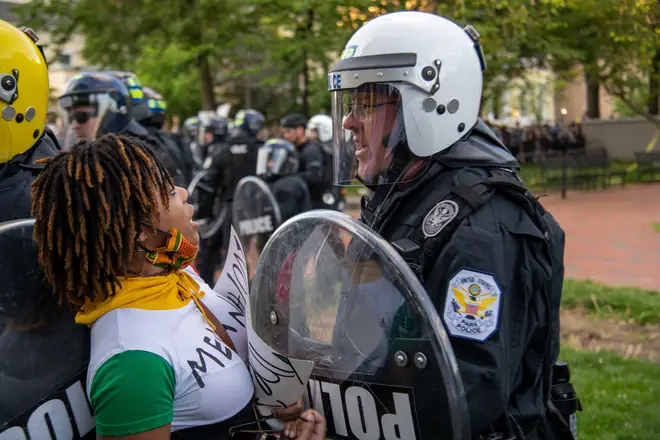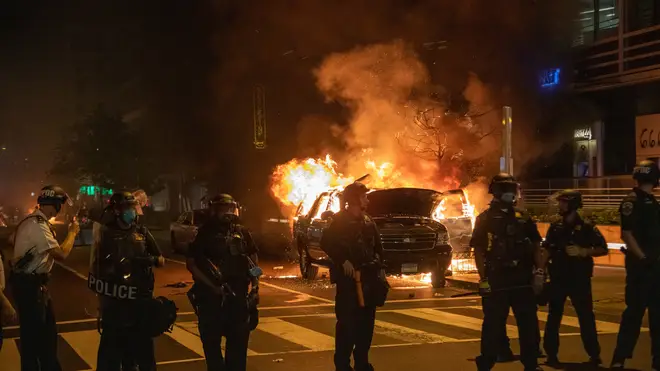
Henry Riley 4am - 7am
1 June 2020, 05:20

George Floyd protests in LA
Hundreds have been arrested at anti-racism protests as US states impose curfews and call in National Guard troops after a further night of violent clashes hit America.
Police and protesters clashed in cities across America in the wake of the death of George Floyd, an unarmed black man, while he was being arrested by Minneapolis police.
Major cities from Los Angeles to Atlanta imposed curfews across cities with thousands of National Guard troops have been deployed across the country in a bid to restore calm, but protesters and police were involved in stand-offs in several cities while there were also fresh reports of looting.

Looters use hatchet to attack ATM during Santa Monica protests

Derek Chauvin, the officer filmed kneeling on Floyd’s neck, was arrested and charged with murder and manslaughter.
Cars and businesses were torched, the words "I can't breathe" were spray-painted all over buildings and a fire in a rubbish bin burned near the gates of the White House, as tens of thousands marched peacefully through city streets to protest against the death of George Floyd.

Washington protester Olga Hall said: "We're sick of it. The cops are out of control. They're wild. There's just been too many dead boys."
Meryl Makielski, a protester in Brooklyn, New York, added: "The mistakes that are happening are not mistakes. They're repeated violent terrorist offences and people need to stop killing black people."

Fire and tear gas outside the Whitehouse in DC
Some protesters set fire to police cars, threw bottles at officers and looted shops - even as other peaceful demonstrators urged them to stop.
On Sunday evening protests turned violent near the White House with demonstrators starting numerous fires and police offices using tear gas in attempts to disperse protesters.
Multiple fires raging near the White House
— Breaking911 (@Breaking911) June 1, 2020
pic.twitter.com/ko4J0m7l6x
In Indianapolis, police are investigating multiple shootings amid the protests, including one that left one person dead - adding to deaths in Detroit and Minneapolis in recent days.
In Minneapolis itself, the city where the protests began, police, state troopers and National Guard members moved in on Saturday soon after an 8pm curfew took effect to break up protests, firing tear gas and rubber bullets to clear streets outside a police station and elsewhere.
At least 13 police officers were injured in Philadelphia when peaceful protests turned violent and at least four police vehicles were set on fire.

Police fire tear gas and rubber bullets at protesters in Santa Monica
In New York City, dangerous confrontations flared repeatedly as officers made arrests and cleared streets. A video showed two NYPD cruisers lurching into a crowd of demonstrators who were pushing a barricade against one of them and pelting it with objects. Several people were knocked to the ground, and it was unclear if anyone was hurt.
Few corners of America are untouched by the protests, with large numbers on the streets from Reno, Fargo and Salt Lake City to Ferguson, Missouri, where Michael Brown was shot and killed by a white police officer in 2014.
Police have arrested at least 1,669 people in 22 cities since Thursday. Nearly a third of those came in Los Angeles, where the governor declared a state of emergency and ordered the National Guard to back up the city's 10,000 police officers as dozens of fires burned across the city.
US President Donald Trump appeared to cheer on the tougher tactics used against protesters on Saturday night, commending the National Guard deployment in Minneapolis as he declared: "No games!," and saying police in New York City "must be allowed to do their job!".
The show of force in Minneapolis came after three days when police largely avoided engaging protesters, and after the state poured in more than 4,000 National Guard troops to the city and said the number would soon rise to nearly 11,000.
Governor Tim Walz, who said local forces had been overwhelmed on Friday, condemned the violence on Saturday as he insisted the protests were no longer about Mr Floyd's death.
"It is about attacking civil society, instilling fear and disrupting our great cities," he said.